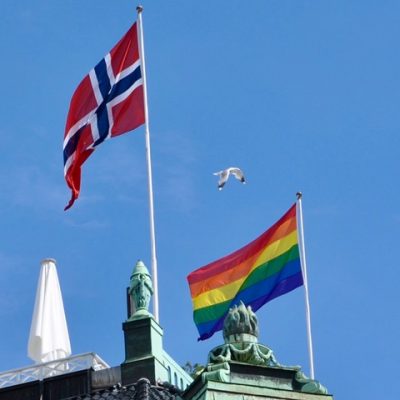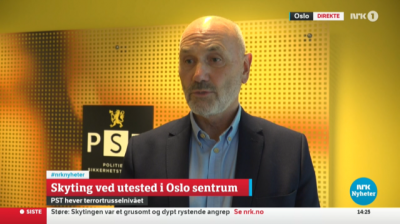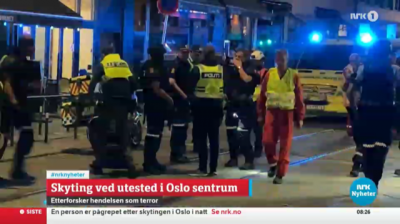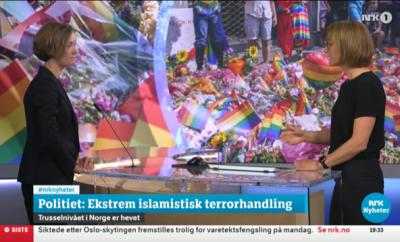NEWS ANALYSIS: This year’s Pride celebrations in Norway were especially important because it’s been 50 years since the country effectively decriminalized homosexuality, in 1972. It’s also been three years since the last Pride events could be held because of the pandemic. Public debate over the scope of the celebrations has been flying, however, and then an extraordinary mass shooting tied to Pride plunged the country into “an extraordinary terror situation.”

News was also flying fast and furious on Saturday, after a mass shooting during the night that killed two, wounded 21 and forced cancellation of the Pride Parade and all Pride events. The leader of Oslo’s city government, Raymond Johansen of the Labour Party, now insists they’re merely “postponed,” claiming at a press conference late Saturday afternoon that “Oslo Pride will come back bigger and stronger than ever.”
Here’s a rundown of other developments:
***Norway’s police intelligence agency PST has raised the terror threat to its highest level, from moderate ranked as Level 3 on a scale from one to five, to Level 5. PST’s acting chief Roger Berg also announced that PST views the mass shooting that began just after 1am as “an extremist Islamic act of terror.” That’s because the gunman, now identified as 42-year-old Zaniar Matapour, has long worried PST because of his history of violence and allegedly radical Islamic views.

Berg told state broadcaster NRK after a press conference Saturday afternoon that Matapour had been on PST’s radar since 2015 and that they’d had “conversations” with him as recently as May. PST officers decided he was not dangerous, with Berg adding that “it’s difficult to know how people think,” or predict how they may act.
He defended earlier, milder evaluations of the terror threat and suspicious persons, even though this is at least the third time in recent years that PST hasn’t acted more offensively on warnings from the public or their own intelligence: not in the case against a young Norwegian man who started shooting at a mosque in Bærum in 2019 nor against another who set off a murderous rampage in Kongsberg last fall.
*** Justice Minister Emilie Enger Mehl, who is politically responsible for PST and the police, declined comment on PST’s evaluation of the defendant pending results of all the investigations into the shooting now going on. She explained that the high terror threat in Norway mostly reflects how the current “situation remains unclear,” stressing that citizens can go about their normal lives, but should be on the alert.
She urged anyone with information that can be relevant to the case to share it with police, and thanked those who helped police during the night with eyewitness accounts and even in helping police control the defendant when he put up strong resistance to his arrest. “Many people helped save lives last night,” Mehl said at the government’s own press conference Saturday afternoon.
Mehl also ordered Norway’s usually unarmed police to carry weapons for the time being. PST has no firm indications of more planned attacks, but the mass shooting “was so serious,” Mehl said, that weapons are deemed warranted, also because the mass shooting may inspire other attacks.
*** Police were finally able to question the defendant, a Norwegian citizen from the Kurdish region of Iran, on Saturday afternoon but not for long. Matapour, who has a criminal record of violence and making threats, refused to cooperate with police after his arrest, claiming they’d manipulate his statements.
John Christian Elden, one of Norway’s most well-known defense attorneys, was appointed as Matapour’s lawyer and told NRK that his client is skeptical towards the police. He did not accept the charges filed against him and will be subject to a mental health evaluation. Elden tried to downplay the terror charges against him that come in addition to those for murder and attempted murder.
Prime Minister Jonas Gahr Støre, meanwhile, noted at the government’s press conference that even though “we don’t know” whether the LHBT+ community was his target, “they were the victims.”
Both he, Justice Minister Mehl and the government minister in charge of equality and culture, Anette Trettebergstuen, all decried how a day that was supposed to promote diversity and gender equality instead became one in which “Norway is again hit by a brutal attack against innocent people.” In addition to the two people killed, both men in their 50s and 60s, 10 people were seriously injured and 11 other suffered minor injuries.

“When the defendant began to shoot … happiness, laughter and love was transformed into hate, bullets and murder,” Støre said. “Our thoughts go to those who lost someone they loved, and to those who are injured and today feel frightened and targeted.”
Støre also noted that many Muslims in Norway are also “in despair today. It’s our responsibility to make sure that no one other than those behind the attack are responsible,” not Muslims as a whole.
The area where the mass shooting occurred has been cordoned off by police, but many streamed to a nearby corner to lay down flowers and rainbow flags. Thousands also marched in a spontaneous parade to show solidarity. Støre, several of his fellow ministers and members of the royal family also paid tribute to the victims at the site, while local city officials made it clear that “we will show them, the hateful terrorists, that they will never win.”
Local debate has been flying, however, over whether Oslo Pride has become too large, too commercial and too political. Few argue that celebrations of gender diversity and the freedom to love whoever you want are warranted, and that no one should ever forget that was once a criminal offense. Norway’s law against sex between men was repealed in 1972, but it wasn’t until 1977 that homosexuality also was removed as a psychiatric diagnosis. Many non-heterosexuals have faced discrimination and harassment over the years, and still do.
There has been resistance to Pride celebrations, though, symbolized by another round of Pride flags being torn down from school flagpoles, and even burned. Not everyone liked seeing the Pride flag raised at Stortinget (Norway’s Parliament) last week, and two Pride flags flying at Bøler School on Oslo’s east side were ripped up. “It makes me sad and angry,” the school’s principal, Britt Bøymo, told newspaper Dagsavisen. “We celebrate Pride so that everyone will feel welcome and can be allowed to be themselves.” She responded to the flag vandalism by making sure she had several flags in reserve.
Some parents and teachers also complained when the director Oslo’s schools, Marte Gerhardsen of the Labour Party, urged schools and their pupils to march in the parade that ultimately had to be postponed. One teacher told Dagsavisen that Gerhardsen and her staff were “pushing their ideology” to schoolchildren, while others noted that the schools don’t participate in, for example, May 1st parades to celebrate workers. Several parents also reacted to how gender diversity is now being taught in the schools. Kjell Ingolf Ropstad, leader of the Christian Democrats party, also criticized Oslo schools for getting too involved in Oslo Pride events.

Others claimed such involvement was only meant to promote tolerance and human rights. Mina Hauge Nærland, commentator in newspaper Aftenposten, suggested that “perhaps those who are now sexually liberated could show more understanding for the intolerant.” She bemoaned how Pride seemed to be turning into a cultural war.
Newspaper Aftenposten reported last week that also some leading voices in the LHBT+ community think the Pride movement is ignoring important criticism and thus guilty of intolerance as well. Inger Kristin Haugsevje, leader of Oslo Pride, insists the organization “shall represent everyone,” stressing that Oslo Pride is independent of FRI, the organization that wants to introduce a third legal gender and promotes assistance for anyone confused about their own gender.
On Saturday, however, they were all in mourning over the mass shooting, its victims and how it utterly spoiled long-awaited celebrations. Equality and Culture Minister Trettebergstuen perhaps summed up the mood best: “I am so incredibly sad,” she said at the government’s press conference. “We would have had our first parade in three years, we needed it and deserved it. The rainbow flag went black today.”
newsinenglish.no/Nina Berglund

